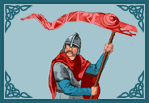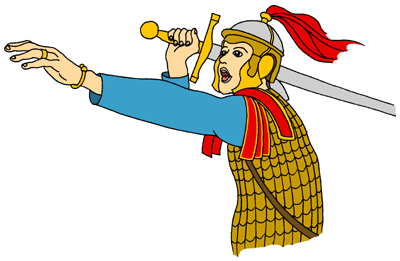 |
 |
|||
|
|
Sir Bedivere was known to the Welsh as Bedwyr
Bedrydant (of the Perfect Sinews) and was therefore, presumably, a very
muscular man. Along with Sir Kay alias Cai
Hir (the Tall), he is one of the most ancient
warriors associated with King
Arthur. He appears in the Mabinogion attached tale of 'Culhwch
and Olwen' as the handsomest warrior who ever was at Arthur's Court, "and,
although he was one-handed, no three warriors drew blood in the same field
faster than he". In the Life of St.
Cadog, he was one of Arthur's entourage sent to pursue
King Gwynllyw of Gwynllwg
after he had abducted St. Gwladys from
her father's court in Brycheiniog.
Bedwyr is also recorded in the Black Book of Carmarthen as having fought
at the unlocated Battle
of Tryfrwyd: "By the hundred they fell before Bedwyr
Bedrydant" for "furious was his nature with shield and sword".
Geoffrey of Monmouth
named him as Arthur's head butler and Duke of Normandy. Bedivere fought
the giant of Mont St. Michel and was highly active in the King's continental
campaigns, during which he may have been killed. The more developed literary
tradition, particularly voiced by Sir Thomas
Malory, makes him Sir Bedivere, the knight who returned
Excalibur to the
Lady of the Lake after the
Battle of Camlann. His brother was named as Sir Lucan. Bedivere/Bedwyr's early appearance in Arthurian tradition suggests that his character could have been based on a real person but there is little tradition of his family. He apparently had a daughter named Enefog and a son, Amren. His father was Bedrawt. Bedwyr's Well, the Ffynnon Fedwyr could once be seen in Northern Gwynllwg, and Welsh tradition says that Bedwyr was buried at Alld Tryvan, which would appear to be Din-Dryfan (Dunraven Castle in Morgannwg). Due to Bedwyr's particular association, therefore, with the kingdoms of Morgannwg and Gwynllwg, it is likely that he was a member of the traditional royal house of Finddu. His recorded father, 'Bedrawt' or Pedrod may have been Prince Pedr son of King Glywys of Glywysing.
|
|||
| © Nash Ford Publishing 2001. All Rights Reserved. | ||||





 Sir Bedivere
Sir Bedivere